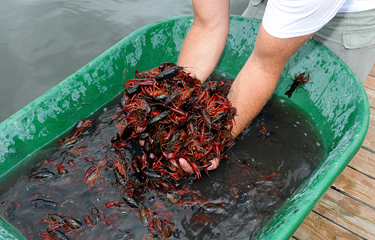Around 100 people at three crawfish farms in Louisiana have tested positive for COVID-19, state health officials announced earlier this week.
The Louisiana Department of Health declined to name the three crawfish farms, citing “active, evolving, protected investigations,” according to The Advocate.
Louisiana Office of Public Health Assistant Secretary Alex Billioux said the outbreaks were concentrated among migrant workers living in dormitory-like settings. The local crawfish industry is highly reliant on workers – many from Mexico – who use H-2B visas to live and work temporarily in the United States. According to Louisiana State University Assistant Professor of Agriculture Economics and Agribusiness Maria Bampasidou, a review of federal data showed Louisiana had 31 seafood processing facilities file for H-2B visas. Collectively, they received nearly all of the 1,467 positions they applied for. The workers live in trailers or bunkhouses provided by employers in exchange for a cut of workers’ paychecks, depending on the type of visa, according to The Advocate.
David Savoy, the operator of a crawfish farm and processing facility near near Church Point, Louisiana, said working and living conditions are tight in most of the industry’s facilities.
“It’s like a house with a family in it,” Savoy said. “If one person gets it, there’s a good chance everyone’s going to get sick. That’s just the reality of the situation.”
He said farms are taking precautions such as conducting frequent cleanings of their facilities, but that building new housing to space out the workers could not be done quickly. Savoy said the workers on his farm have not contracted the virus thus far.
The New Orleans Workers’ Center for Racial Justice and the Louisiana-based Seafood Workers Alliance have called for reforms to the crawfish industry’s system of labor, claiming workers risk their pay and housing if and when they discuss problems with their situations. The organization has demanded an end to deportation of seafood workers additional labor protections in the sector, as well as better enforcement of existing rules.
“[It’s the] perfect recipe for unsafe working conditions going unreported,” it said.
Seafood Workers Alliance organizer Sabina Hinz-Foley Trejo said conditions in crawfish production facilities are unsanitary and that workers have not received hazard pay.
“It’s elbow to elbow. No shields. In some places, no masks,” she said.
Photo courtesy of Chuck Wagner/Shutterstock







